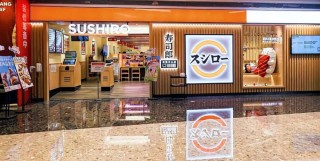Loading
Search
▼ Japan Restaurant Chain Giants Resume Efforts to Grow Overseas
- Category:Gourmet
Restaurant chain giants are renewing their efforts to expand overseas after being slowed by the novel coronavirus pandemic. Operators are primarily eyeing Asia and North America as global economic activity starts to pick up and the Japanese market heads toward decline due to the nation’s dwindling population.
Duskin Co. announced Feb. 1 that it will make its first foray into Singapore in May with its Mister Donut fast-food franchise.
It will be the first time in eight years for a new Mister Donut outlet to open overseas, and Singapore will become the fifth foreign country or region to host a Duskin-operated donut shop, following Thailand and Indonesia.
Duskin’s move follows a positive response to a one-month donut-marketing trial last summer that saw Singaporeans wait in line for up to five hours.
The company, which had been considering entering the Singapore market since 2018, signed a franchise agreement in November with a company that operates Japanese restaurants in Singapore in anticipation of the resumption of post-pandemic economic activities.
Duskin will market about 20 different donuts and other products in Singapore — where it plans to open at least nine stores in the next three years — using the same ingredients it uses in Japan.
“If we’re successful in Singapore, we’d like to expand operations to neighboring countries,” Duskin Co. President Hiroyuki Okubo said at a press conference.
Torikizoku Holdings Co., which operates a major tavern chain, will establish a subsidiary in Los Angeles in April. In a medium-term management plan unveiled in 2019, the company announced its intention to enter the market by opening its first overseas outlet by July 2022, but this plan was shelved due to the spread of COVID-19. The company now aims to establish an outlet sometime in the next 12 to 24 months.
Conveyor-belt sushi chain operator Food & Life Companies Ltd., meanwhile, is accelerating the pace at which it is opening new Sushiro outlets in China.
According to the Japan Food Service Association, sales at domestic restaurant chains in 2022 rose 13.3% from the previous year, marking the first year-on-year increase in three years, but representing a 5.8% decline when compared to 2019.
Recovery in demand for eating out in the evening was particularly sluggish. Sales at bars and izakaya pubs improved by 80.9% compared to previous year, but this is still only half the level of 2019.
Many establishments have been forced to cut their business hours and have had trouble hiring employees due to a labor shortage. “In order to continue to grow, it’s essential for us to expand overseas,” Torikizoku Holdings President Tadashi Okura said.
As the domestic market moves toward decline, many other corporate managers are said to hold similar views to Okura.
Rising costs for raw materials and soaring energy prices are putting pressure on business performance. Conveyor-belt sushi chain Kura Sushi, Inc. posted core business operating losses for the business year that ended October 2022, marking its second consecutive year of deficit due to price hikes for raw materials, gas and electricity.
Singapore foray
Duskin Co. announced Feb. 1 that it will make its first foray into Singapore in May with its Mister Donut fast-food franchise.
It will be the first time in eight years for a new Mister Donut outlet to open overseas, and Singapore will become the fifth foreign country or region to host a Duskin-operated donut shop, following Thailand and Indonesia.
Duskin’s move follows a positive response to a one-month donut-marketing trial last summer that saw Singaporeans wait in line for up to five hours.
The company, which had been considering entering the Singapore market since 2018, signed a franchise agreement in November with a company that operates Japanese restaurants in Singapore in anticipation of the resumption of post-pandemic economic activities.
Duskin will market about 20 different donuts and other products in Singapore — where it plans to open at least nine stores in the next three years — using the same ingredients it uses in Japan.
“If we’re successful in Singapore, we’d like to expand operations to neighboring countries,” Duskin Co. President Hiroyuki Okubo said at a press conference.
Torikizoku Holdings Co., which operates a major tavern chain, will establish a subsidiary in Los Angeles in April. In a medium-term management plan unveiled in 2019, the company announced its intention to enter the market by opening its first overseas outlet by July 2022, but this plan was shelved due to the spread of COVID-19. The company now aims to establish an outlet sometime in the next 12 to 24 months.
Conveyor-belt sushi chain operator Food & Life Companies Ltd., meanwhile, is accelerating the pace at which it is opening new Sushiro outlets in China.
Labor shortage
According to the Japan Food Service Association, sales at domestic restaurant chains in 2022 rose 13.3% from the previous year, marking the first year-on-year increase in three years, but representing a 5.8% decline when compared to 2019.
Recovery in demand for eating out in the evening was particularly sluggish. Sales at bars and izakaya pubs improved by 80.9% compared to previous year, but this is still only half the level of 2019.
Many establishments have been forced to cut their business hours and have had trouble hiring employees due to a labor shortage. “In order to continue to grow, it’s essential for us to expand overseas,” Torikizoku Holdings President Tadashi Okura said.
As the domestic market moves toward decline, many other corporate managers are said to hold similar views to Okura.
Rising costs for raw materials and soaring energy prices are putting pressure on business performance. Conveyor-belt sushi chain Kura Sushi, Inc. posted core business operating losses for the business year that ended October 2022, marking its second consecutive year of deficit due to price hikes for raw materials, gas and electricity.
- February 20, 2023
- Comment (0)
- Trackback(0)


